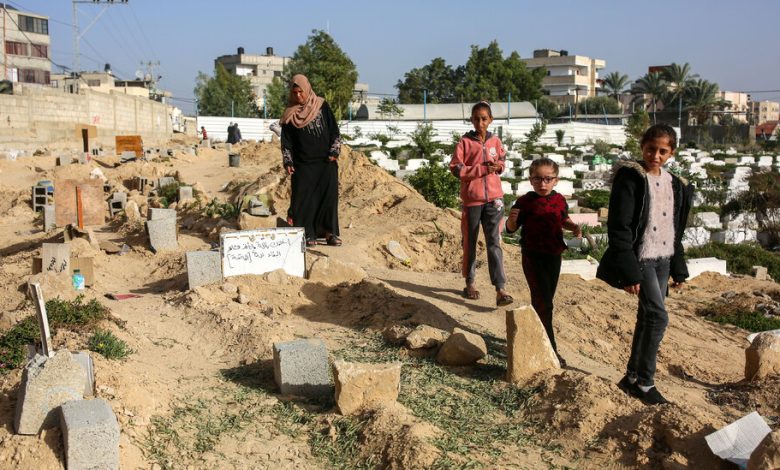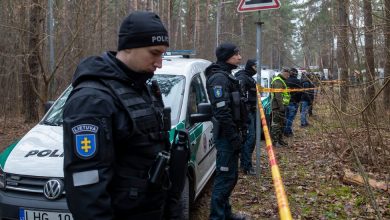As Gaza Losses Mount Under Strikes, Dignified Burials Are Another Casualty

For four days, Kareem Sabawi’s body lay wrapped in a blanket in a cold, empty apartment as his family sheltered nearby. He was killed during intense Israeli bombardment near his family home, his father and mother said, and in the days that followed, it was too dangerous to step outside and lay their 10-year-old child to rest.
His family called the Palestine Red Crescent for help. But it was the early days of Israel’s ground invasion in northern Gaza, and forces were blocking streets with tanks and gunfire, preventing rescue workers from reaching those killed by Israeli airstrikes. Each day, the father, Hazem Sabawi, suffered a double torment — mourning his son and unable to afford him the final dignity of a proper burial.
“After the fourth day, I said that’s it. Either I will be buried with him, or I won’t bury him at all,” he said, recounting how he laid his son under a guava tree behind a neighbor’s apartment building.
“Every human has the right to be buried,” Mr. Sabawi said.
It has been 13 weeks since Israel’s war in Gaza began after the attack on Israel by Hamas, which killed about 1,200 people, according to Israeli officials. Since then, the living in Gaza have been forced to inter their dead hurriedly and without ceremony or last rites, lest they risk the same fate as their loved ones.
More than 22,000 Palestinians have been killed by Israel since Oct. 7, according to the Gaza Health Ministry. Civilians are being killed at a pace with few precedents in this century. The conflict has turned Gaza into a “graveyard for thousands of children,” the United Nations said.
“The situation has gotten to the point where we say: The lucky are those who have someone to bury them when they die,” said Dr. Mohammad Abu Moussa, a radiologist at Al-Nasr Hospital in southern Gaza.

Bodies on the ground in October outside Nasser Hospital in Khan Younis.Credit…Samar Abu Elouf for The New York Times
Traditionally, Palestinians honor their dead with public funeral processions and mourning tents erected on streets for three days to receive those who want to offer condolences. But the war has made those traditions impossible to uphold.
Instead, the dead have been buried in mass graves, hospital courtyards and backyard gardens, often without headstones, their names scrawled on white burial shrouds or body bags. Funeral prayers are said quickly — if at all — in hospital hallways or outside morgues.
Nebal Farsakh, a spokeswoman for the Palestine Red Crescent, said the violence often made it impossible for rescuers to reach attack sites or recover bodies. Some families have been trapped inside their homes for days with the corpses of their loved ones, she said.
Gaza health officials estimate that about 7,000 people in Gaza are missing, most presumed dead under the enormous destruction from Israel’s onslaught. On some homes, people have spray painted the names of those believed to be buried under the rubble.
As nearly two million civilians have been displaced and made dangerous treks on foot to southern Gaza — passing Israeli forces with guns trained on them — some have described seeing dozens of bodies along the way, bloated and decomposing. They have told The New York Times that Israeli soldiers would not allow them to even cover, much less bury, the dead.
The Israeli military said it had prevented people from approaching bodies “for operational reasons” and also to determine whether any of the dead might be Israeli hostages taken by Hamas to Gaza on Oct. 7.
For Mr. Sabawi, burying Kareem was the least he could do for a son he felt he was unable to protect.
He and his wife said an Israeli airstrike hit near their home in early November when their family was preparing lunch with what little flour and rations they had. Mr. Sabawi was thrown in the air, and when he hit the floor, the kitchen door fell on him. When he got up, he saw Kareem bleeding profusely from his head.
Mr. Sabawi said he scooped him up, even though his arm was injured, and the family ran to a neighbor’s apartment. Kareem was still breathing as his panicked father administered CPR.
It was too late.
Neighbors took the family in and brought a blanket to wrap Kareem’s body, Mr. Sabawi said. He waited four days, fearing they might be killed by an airstrike or Israeli soldier if they went outside to bury him. On the fifth day, Mr. Sabawi and a neighbor said the Muslim proclamation of faith before leaving the apartment.
In the garden behind the building, they dug a shallow grave and laid Kareem in it, covering him with dirt, and rushed back inside.
“The next day, I went back down to put more dirt over the grave,” Mr. Sabawi said. On the tree, he hung a makeshift headstone and placed a brick at the top. “Every time there was an opportunity, I went down to put more dirt so it would become a proper grave.”
His wife, Suha Sabawi, 32, said she knew that not all parents in Gaza got the opportunity for such bittersweet closure.
“Lots of people said to me, ‘Thank God you were able to bury your son,’ because lots of people can’t bury their children,” she said.
Ahmed Alhattab, a father of four, said a rocket struck his apartment building on the night of Nov. 7 in Gaza City. There were 32 family members inside, 19 of them children. Palestinian news media reported the strike at the time, putting the initial death toll at 10.
Mr. Alhattab and three of his sons escaped from the rubble, but one had a skull fracture and was bleeding, he said. Mr. Alhattab handed his two uninjured sons — aged 5 and 9 — to neighbors and carried his wounded 7-year-old, Yahya, until he found an ambulance to take him to a hospital.
The next morning, he said, he returned with neighbors and relatives, and they dug out four dead family members with their hands, among them his 32-day-old nephew.
They buried them in a single grave in a private cemetery that belonged to another family because it was too dangerous to get to the public cemeteries farther away. Some public cemeteries have also been razed by Israeli forces.
The rest of his family, 24 relatives, he said, remained under too much rubble to recover.
For three days, Mr. Alhattab said, he stayed at the hospital as his son underwent surgery. The hospital was nearing collapse as airstrikes and clashes raged nearby.
He was told his son was unlikely to survive.
As relatives prepared to flee, he said, he made the heart-wrenching decision to leave Yahya behind to take his other sons south, where he hoped they would be safer.
Four days later, he heard from a friend that his son had died in the hospital, where he was buried along with other patients who died.
“The burial was temporary,” Mr. Alhattab said, “and I don’t know what happened with his body.”
Medical workers have told The Times they have sometimes had to dig graves in hospital courtyards. When staff members were forced by the Israeli military to evacuate, they said, they had to leave many bodies behind.
Now in southern Gaza, Mr. Alhattab says he wants to go home to recover his family’s bodies.
“When we bury the dead, we honor them,” he said. “And it calms one’s heart a little bit. You know where they are buried.”
When Fatima Alrayess, 35 and living in Austria, last spoke to her two younger brothers on Nov. 8, they told her they were headed back to their family home in Gaza City.
The brothers — Muhammad, 31, and Muayid, 25 — told her that a civil defense crew was on its way to the seven-story building, which had been felled by an Israeli airstrike three days earlier, she said. They said the attack had killed eight family members, including her parents.
“He wanted to bury them,” she said of Muayid.
But an Israeli siege of Gaza from the early days of the war had created dire shortages of fuel, among other essential goods, severely hampering the work of civil defense crews.
That day, the civil defense workers recovered the bodies of their mother, father and a 12-year-old nephew before it got too dark, Ms. Alrayess and another relative, Lubna Alrayess, learned from the brothers.
The next day, the brothers buried the bodies of the three family members in a cemetery and met civil defense workers at the demolished building in hopes of recovering more bodies, Fatima Alrayess said. Two sisters — one a dentist and the other a banker — a brother and two nephews were still missing.
As the rescuers began combing through the rubble, another Israeli airstrike hit, killing both Muayid and Muhammad, as well as several civil defense workers, according to Ms. Alrayess, her relative and Palestinian news reports.
The immediate aftermath of the strike was captured on video by a local photographer, who lamented that the brothers had followed their parents in death.
“My parents were buried in the afternoon,” Ms. Alrayess said. “Muayid and Muhammad were buried later that night in the same cemetery.”
Five members of the family remain under the rubble.
Ameera Harouda contributed reporting.




